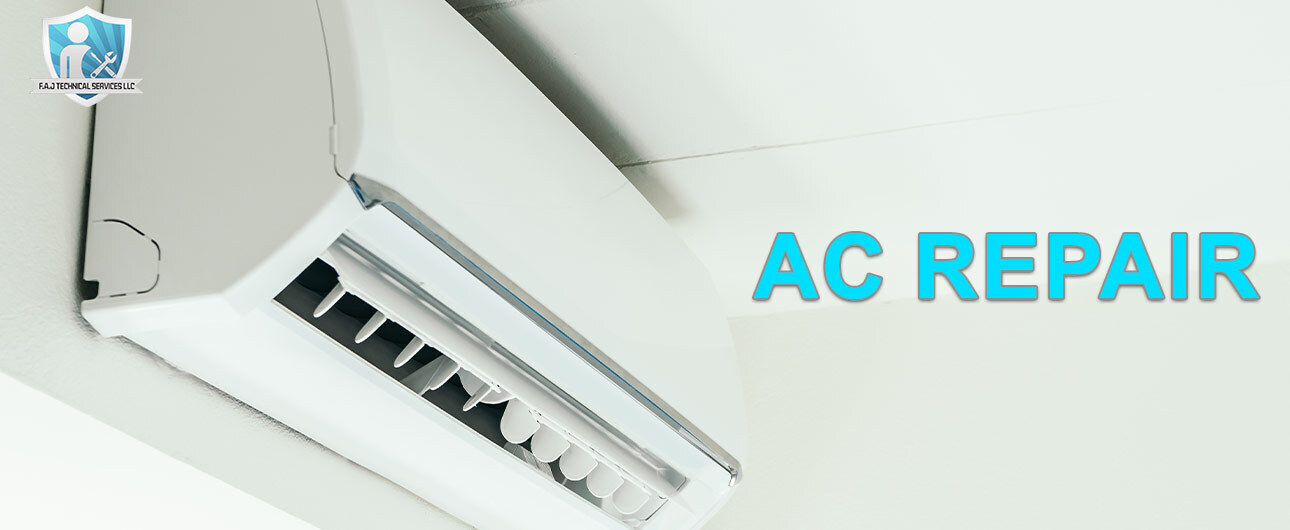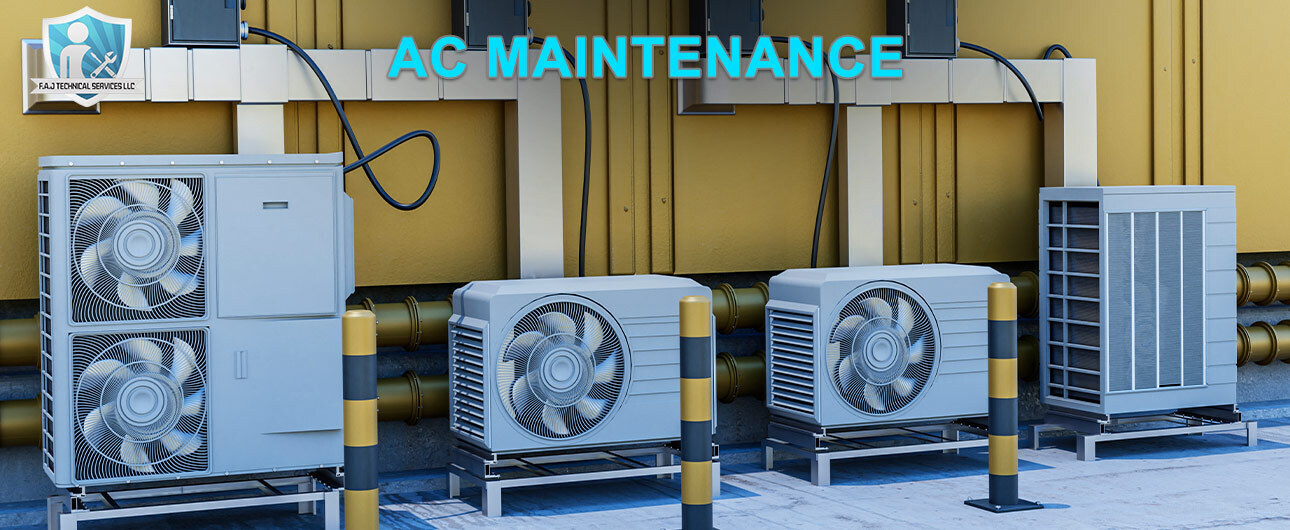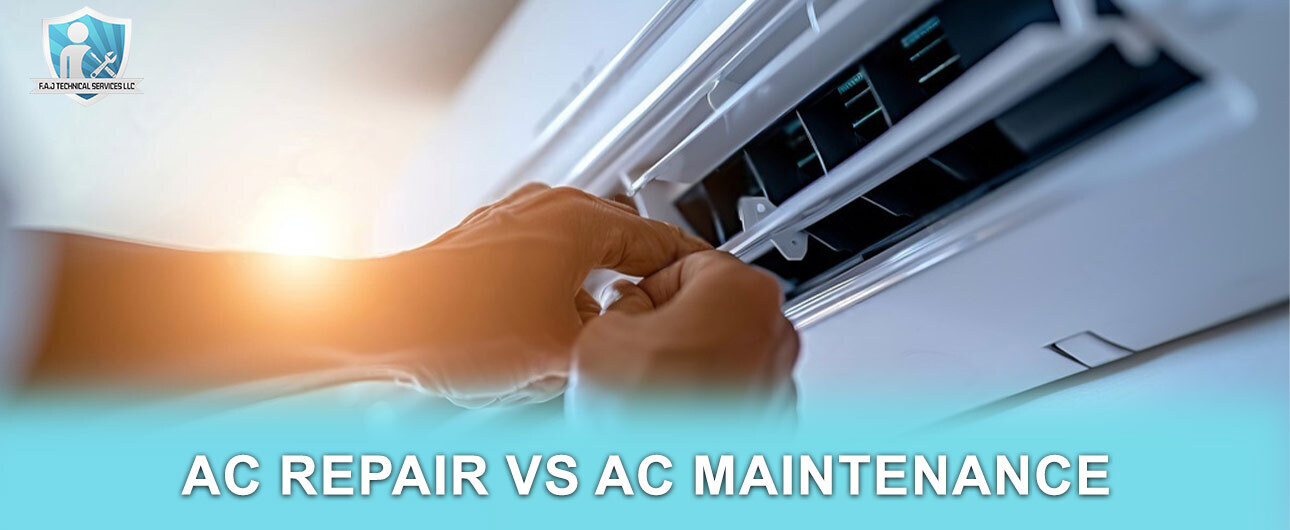Air conditioners are the life long partners to keep your home cool and comfortable during hot summers. However; of your if your AC suddenly stops working, it raises the critical question: is it time for repair or just routine maintenance? Knowing the difference between AC repair and maintenance can save your time and money.
AC maintenance involves regular inspections, cleaning, and tuning to prevent issues and maintain optimal performance. AC repair focuses on fixing specific malfunctions or problems that have caused the AC system to stop working or perform inefficiently.
In this blog guide, we will discuss the difference between AC maintenance and AC repair.
What is AC Repair?

AC repair refers to fixing any problems in the air conditioner system. These services are usually needed when specific components fail to perform or break down like part of compressor, thermostat or fan motor. Problems in wiring and electrical connection, fault in sensor, refrigerant leakage cause low performance and improper functioning of air conditioner unit.
Indicators Your AC Need Repair
- Inadequate Cooling: Despite running, your AC doesn't cool your home effectively.
- Strange Noises: Unusual sounds like grinding, squealing, or banging.
- Frequent Cycling: AC turns on and off frequently, not completing full cooling cycles.
- High Humidity Levels: AC fails to dehumidify properly.
- Unpleasant Odors: Foul smells from vents when AC is running.
- Water Leaks: Leakage or pooling of water around or in the unit.
- Increased Energy Bills: Sudden spike in energy costs without increased usage.
- Airflow Issues: Weak or inconsistent airflow from vents.
- Tripped Circuit Breakers: AC unit frequently trips the circuit breaker.
- Age of the System: AC is old and prone to breakdowns.
AC Repair Includes
Here's what you need to know about AC repair:
1. Diagnostics
When you notice a problem with your air conditioner, such as strange noises, poor airflow, or inconsistent cooling, it's time to call in a professional for AC repair. The technician will perform diagnostics to identify the root cause of the issue.
2. Repair
Once the problem has been diagnosed, the technician will proceed with the necessary repairs. This could involve replacing faulty components, fixing leaks, or addressing electrical issues. The goal is to restore your air conditioner to full functionality as quickly and efficiently as possible.
3. Testing
After completing the repairs, the technician will test your air conditioner to ensure that the problem has been resolved. They'll check for proper airflow, temperature control, and overall performance to make sure everything is working as it should.
You might also like: 10 Common AC Problems and How to Fix them
What is AC Maintenance?

AC maintenance refers to daily routine activities to look after and keep the air conditioner system working smoothly. It includes tasks like cleaning filters, inspecting coils, checking refrigerant levels, and ensuring all components work properly. Regular maintenance helps to prevent breakdowns, improve energy efficiency, and maintain indoor air quality.
Indicators Your AC Needs Maintenance
- Decreased Cooling Efficiency: Longer cooling times or difficulty maintaining desired temperatures.
- Higher Energy Bills: Increased costs without increased usage.
- Uneven Cooling: Inconsistent temperatures across different areas of your home.
- Strange Smells: Musty or stale odors when the AC is running.
- Noisy Operation: Unusual sounds like rattling or banging.
- Visible Leaks or Moisture: Water pooling around the AC unit or leaks.
- Poor Air Quality: Dusty or dirty air from the vents.
- Older System: Aging AC or lack of recent maintenance.
- Manufacturer Recommendations: Not following recommended service intervals.
- Seasonal Preparation: Ensuring the AC is ready before each cooling season.
AC Maintenance Includes
AC maintenance typically includes the following tasks:
- Cleaning or Replacing Air Filters: Regularly cleaning or replacing air filters ensures efficient airflow and improves indoor air quality.
- Checking and Refilling Refrigerant: Inspecting refrigerant levels and refilling if necessary to maintain optimal cooling performance
- Inspecting and Cleaning Evaporator and Condenser Coils: Cleaning coils removes dirt and debris that can affect efficiency.
- Inspecting and Cleaning Condensate Drain: Ensuring the condensate drain is clear to prevent water backups and potential water damage.
- Checking Thermostat Settings: Verifying the thermostat is calibrated correctly for accurate temperature control.
- Inspecting Electrical Connections: Checking electrical connections and tightening any loose connections to prevent system failures.
- Lubricating Moving Parts: Lubricating motors and other moving parts to reduce friction and wear.
- Adjusting Blower Components: Ensuring the blower components are properly adjusted for adequate airflow.
- Checking Ductwork for Leaks: Inspecting ducts for leaks or gaps that could affect cooling efficiency.
- Testing System Controls: Testing the starting cycle, operation sequence, and shutdown sequence to ensure proper system operation.
Key Differences Between AC Repair and Maintenance
Purpose:
- Maintenance: Preventive care to maintain efficiency.
- Repair: Addressing existing issues to restore functionality.
Timing:
- Maintenance: Scheduled regularly, ideally before peak seasons.
- Repair: Undertaken when issues arise or during breakdowns.
Cost Implications:
- Maintenance: Affordable, reduces risk of costly repairs.
- Repair: Costs vary based on issue severity and parts required.
When to Opt for AC Maintenance vs Repair
Optimal Times for Maintenance:
- Before Summer: Ensure peak efficiency during hot months.
- Annually: Regular upkeep prevents major issues.
Signs You Need AC Repair:
- Inadequate Cooling: Rooms not cooling as expected.
- Unusual Noises: Grinding, squealing, or banging sounds.
- Frequent Cycling: AC turns on and off frequently.
Why Both Are Important
For overall best performance and longevity, both repairing and maintenance are equally crucial for the air conditioner system. Regular maintenance support the system works efficiently and helps prevent costly repairs. However if a major problem arises then repair is necessary to restore functionality and prevent more damage.
According to the DOE's Energy Saver Guide, regular maintenance of heating and cooling systems, including air conditioners, can improve efficiency and longevity, ultimately saving homeowners money and reducing energy consumption.
According to a study by the American Society of Heating, Refrigerating and Air-Conditioning Engineers (ASHRAE), well-maintained HVAC systems can reduce energy consumption by up to 20% compared to systems that are not regularly maintained.
Who Will Repair or Maintain My AC Unit?
You can yourself perform regular AC maintenance tasks but it is always recommended to call a professional for any repair and maintenance tasks of your air conditioner.
In Dubai, FAJ Technical Services LLC is the #1 AC repair and maintenance service provider, with years of experience, professional technicians, positive reviews, and affordable prices. FAJ AC repair professionals can repair and maintain all AC types and brands.
Contact FAJ Technical Services LLC for all your AC repair and maintenance needs in Dubai.
Conclusion
Understanding the difference between AC repair and maintenance is essential for ensuring your AC operates efficiently throughout its lifespan. By prioritizing regular maintenance and addressing repairs promptly, you can extend the life of your system and avoid unexpected breakdowns.
